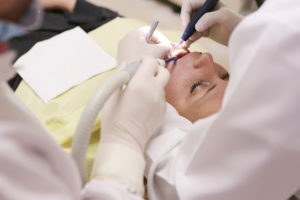 Your teeth aren’t the only component of a healthy smile. Your gums are equally important. They create a seal around your teeth to protect the roots, bone, and underlying structures from bacteria. Unfortunately, it’s easy for the soft tissues to be damaged by trauma, infections, or bad habits, like brushing too hard. If you have gum recession, your dentist may recommend a grafting procedure to restore a healthy, attractive gum line. There are different types of gum grafts, depending on your needs. Here are 4 options your oral surgeon may suggest.
Your teeth aren’t the only component of a healthy smile. Your gums are equally important. They create a seal around your teeth to protect the roots, bone, and underlying structures from bacteria. Unfortunately, it’s easy for the soft tissues to be damaged by trauma, infections, or bad habits, like brushing too hard. If you have gum recession, your dentist may recommend a grafting procedure to restore a healthy, attractive gum line. There are different types of gum grafts, depending on your needs. Here are 4 options your oral surgeon may suggest.
1. Gingival Flap Surgery
Also known as pocket reduction, the procedure can be used for patients with moderate to advanced stages of gum disease. It stops bacteria and plaque from spreading to your surrounding tissues to prevent bone or tooth loss. The gums are folded back to allow the surgeon to remove bacteria. After the pockets have been cleaned, the tissue is secured in place against your teeth.
2. Gum Regeneration
Gum regeneration is a little more invasive than pocket reduction, which is often used for patients with advanced gum disease. The gums are folded back to remove bacteria and a bone graft is placed. The graft can stimulate new gum tissue growth to reverse the damages caused by an infection.
3. Gum Grafting
If too much gum tissue has been lost, the roots of your teeth can be exposed. You may be a candidate for gum grafting. The procedure takes tissue from a donor or elsewhere in your mouth to graft over the exposed roots.
4. Crown Lengthening
In some situations, too little gum tissue isn’t the issue. Instead, excess tissue can be the problem. If too much tissue covers the surfaces of your teeth, it can make them look short or stubby, also known as a “gummy smile.” However, it’s more than an aesthetic concern. You can have an added risk of infections. Crown lengthening uses a soft tissue laser to remove the extra tissue to reveal more of the teeth. Not only will your teeth look longer, but you’ll reduce your risk of future dental concerns, like gum disease.
Is Gum Surgery Right for You?
Only an oral surgeon can determine if gum surgery is right for you. They’ll examine your mouth and learn more about your health to ensure you’re a candidate. Patients with uncontrolled medical conditions, bleeding disorders, or heart conditions may have increased risks of complications. Your dental team will create a personalized treatment plan to restore your gum health safely.
If your gum line is receding or damaged by an infection, you can have a healthy, attractive smile with the latest solutions in dentistry.
About Dr. Stephen Walker
Dr. Walker earned his dental degree from the Baylor College of Dentistry and has completed advanced education in periodontics to achieve his certification. He combines his qualifications with the latest surgical techniques and technologies to provide superior care. If you need gum grafting, contact our office today to request a consultation.

